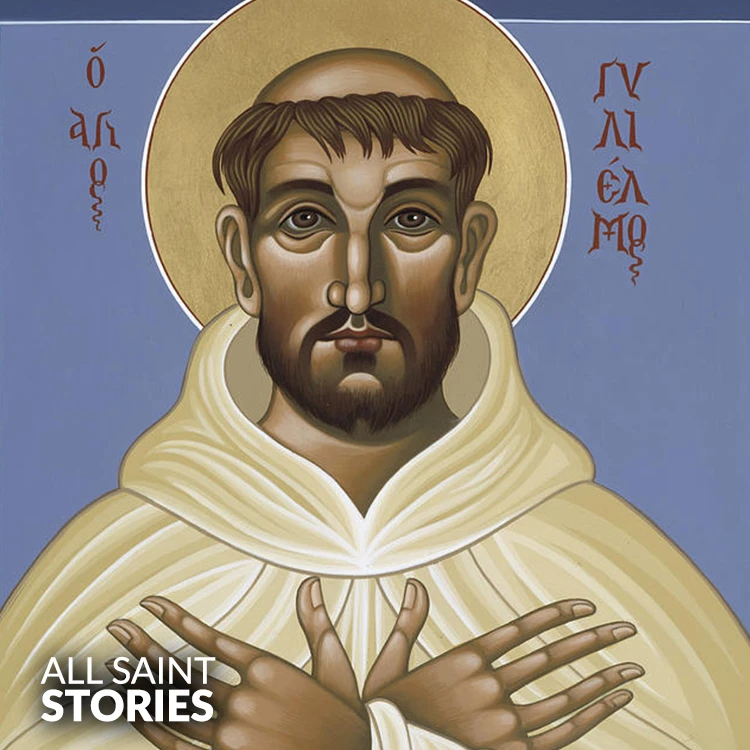Dear St. William. patron saint of adopted children and adopted people, we pray to you for your intercession in guiding and protecting all those who have been adopted, as well as those who have adopted them. May your compassion and wisdom help them navigate life's challenges and find peace and joy in their hearts. Amen
ST. WILLIM OF MONTEVERGINE
ST. WILLIM OF MONTEVERGINE

Saint William of Montevergine was the 12th-century founder of the Montevergine Abbey in Campania, Italy. Born in the early 11th century, he devoted his life to monasticism, creating a community dedicated to simplicity, prayer, and asceticism. He was canonized by Pope Innocent II in 1131, shortly after his death, and his relics are preserved at Montevergine Abbey, a major pilgrimage site.
Saint William of Montevergine, also known as Guglielmo di Montevergine, was born in Vercelli, Italy, during the early 11th century. He grew up in a deeply religious environment, which shaped his devotion to the monastic life. While still young, William decided to leave behind worldly comforts and seek a life of asceticism and prayer. His spiritual journey led him to the mountains near Mercogliano in the region of Campania, where he founded the Abbey of Montevergine in 1119.
The goal behind establishing the monastery was to create a community where simplicity, contemplation, and devotion to God were central to everyday life. Over the years, Montevergine Abbey became a place where monks lived in seclusion, focusing on prayer, meditation, and service. The abbey attracted many followers, and William’s teachings gained widespread influence in southern Italy. His ascetic practices and dedication to spiritual discipline were deeply inspiring, and he became known for his miraculous works.
Throughout his life, Saint William performed numerous miracles, which contributed to his reputation as a holy man. His deep faith and commitment to prayer became key aspects of his legacy. Upon his death in 1142, William was buried at the Abbey of Montevergine, and the site soon became a major pilgrimage destination. His canonization by Pope Innocent II took place shortly after his passing, cementing his place as one of the most revered saints in southern Italy.
Today, Montevergine Abbey remains an important religious center, drawing visitors from across the globe. Saint William’s relics are still preserved there, and pilgrims continue to seek his intercession for guidance and healing. His life and legacy stand as an example of humility, devotion, and the power of prayer.
Video Not Found
The information you see here may be either accurate or might contain some discrepancies, as it is gathered from various sources. If you believe that any part of the details about this saint is incorrect or incomplete, we kindly invite you to share your suggestions or corrections with us. Your insights are invaluable in helping us ensure that we provide the most accurate and reliable information.
We encourage you to use the form on the left to submit any corrections or additional information you may have. Whether it's a small detail or a larger correction, we will carefully review your submission and update the information accordingly. Your contributions will not only help us maintain the integrity of the content but also benefit others who seek to learn more about this saint. We greatly appreciate your assistance in making our information more accurate and complete.
Please rest assured that your personal details will remain confidential, and your suggestions will be handled with the utmost care. Together, we can ensure that the information about this saint is as accurate and informative as possible. Thank you for your time and contribution!
If you have any suggestion about ST. WILLIM OF MONTEVERGINE
Your suggestion will help improve the information about this saint. Your details will not be disclosed anywhere.
© 2025 Copyright @ www.allsaintstories.com





 English
English
 Italian
Italian
 French
French
 Spanish
Spanish
 Malayalam
Malayalam
 Russian
Russian
 Korean
Korean
 Sinhala
Sinhala
 Japanese
Japanese
 Arabic
Arabic
 Portuguese
Portuguese
 Bantu
Bantu
 Greek
Greek
 German
German
 Dutch
Dutch